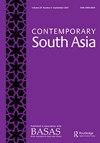Bottom-up imaginaries: examining discursive construction of social media roles and affordances in India
IF 0.8
3区 社会学
Q3 AREA STUDIES
引用次数: 0
Abstract
ABSTRACT In this article, I analyze discourses around the introduction of Intermediary Guidelines and Digital Media Code – new changes in laws regulating new media companies in India, and how these discourses inform the imaginations about the rights and duties of corporations and citizens in the country. I argue that though these guidelines were brought into effect through legal and juridical channels, they were reified through state-led and user-generated political discourse, constituting bottom-up imaginaries about the governance of social media platforms. To comprehensively analyze the impact of the guidelines regulating social media companies, this article argues for the need to examine the interlinkages between online discourse and policy regulations at three levels of operation: (a) the government’s imagination for the country’s digital future, (b) quotidian online discourse reifying the politics of regulation and (c) the dominant imagination of social media as socio-political actors responsible for upholding democracy, the freedom of speech of users, and dissent. Based on the findings and analysis, I argue that the regulation of social media platforms in India demonstrates reconfiguring relationships between social media companies, emerging forms of nationalism, and the government’s expectations of compliance from social media companies.自下而上的想象:审视印度社会媒体角色和支持的话语建构
在本文中,我分析了围绕《中介准则》和《数字媒体准则》的引入的话语——印度监管新媒体公司的法律的新变化,以及这些话语如何影响人们对印度企业和公民权利和义务的想象。我认为,虽然这些指导方针是通过法律和司法渠道实施的,但它们是通过国家主导和用户生成的政治话语具体化的,构成了对社交媒体平台治理的自下而上的想象。为了全面分析规范社交媒体公司的指导方针的影响,本文认为有必要在三个操作层面检查在线话语与政策法规之间的相互联系:(a)政府对国家数字未来的想象,(b)日常在线话语将监管政治具体化,以及(c)社交媒体作为负责维护民主、用户言论自由和持不同政见者的社会政治行动者的主导想象。根据调查结果和分析,我认为印度对社交媒体平台的监管表明了社交媒体公司之间关系的重新配置,新兴的民族主义形式,以及政府对社交媒体公司合规的期望。
本文章由计算机程序翻译,如有差异,请以英文原文为准。
求助全文
约1分钟内获得全文
求助全文
来源期刊

Contemporary South Asia
AREA STUDIES-
CiteScore
2.10
自引率
0.00%
发文量
82
期刊介绍:
The countries of South Asia - Bangladesh, Bhutan, India, Maldives, Nepal, Pakistan and Sri Lanka - are internally diverse and part of global flows of people, goods and ideas. Contemporary South Asia seeks to address the issues of the region by presenting research and analysis which is both cross-regional and multi-disciplinary. The journal encourages the development of new perspectives on the study of South Asia from across the arts and social sciences disciplines. We also welcome contributions to pan-regional and inter-disciplinary analysis. Our aim is to create a vibrant research space to explore the multidimensional issues of concern to scholars working on South Asia and South Asian diasporas in the postcolonial era.
 求助内容:
求助内容: 应助结果提醒方式:
应助结果提醒方式:


